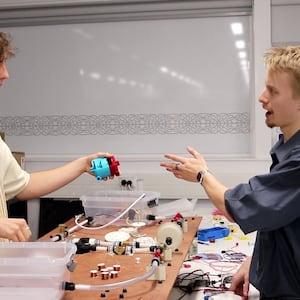Health
University of Canterbury Students Innovate Artificial Heart for Transplants

A team of students from the University of Canterbury is developing an innovative artificial heart that could potentially transform treatment options for heart failure patients. This initiative aims to address the significant gap between the number of patients awaiting heart transplants and the available donor organs. The students will showcase their prototype at the prestigious Heart Hackathon competition in Vienna in December 2023, representing New Zealand on an international stage.
The Heart Hackathon is an annual event that invites student teams from around the globe to collaboratively design and create artificial hearts. According to the World Health Organization, cardiovascular disease remains the leading cause of death worldwide, responsible for approximately 17.9 million fatalities each year. Despite the urgent need, only about 7,000 donor hearts are available for transplants annually, leaving around 50,000 patients in desperate need.
Over the past three years, six Bachelor of Engineering (Honours) students have been developing their prototype under the expert guidance of Dr. James Hewett, Dr. Natalia Kabaliuk, and Associate Professor Deborah Munro. Their work is supported by a grant from the Heart Foundation, which underscores the project’s potential impact on heart disease treatment.
The students are focused on refining their design to ensure it meets the necessary medical and engineering standards. Their participation in the Heart Hackathon represents not only a significant opportunity for learning and innovation but also a chance to contribute to a solution for a pressing global health issue.
As they prepare for the competition, the students are enthusiastic about the prospects of their project. The event will draw attention from experts in the field and could lead to further development opportunities for their artificial heart.
The journey of these University of Canterbury students highlights the intersection of education, innovation, and healthcare. Their commitment to addressing the challenges faced by heart failure patients embodies the spirit of collaboration and creativity essential for advancing medical technology. The outcome of their participation in Vienna could play a pivotal role in shaping the future of heart transplant options.
-

 World3 months ago
World3 months agoTest Your Knowledge: Take the Herald’s Afternoon Quiz Today
-

 Sports3 months ago
Sports3 months agoPM Faces Backlash from Fans During Netball Trophy Ceremony
-

 Lifestyle3 months ago
Lifestyle3 months agoDunedin Designers Win Top Award at Hokonui Fashion Event
-

 Sports3 months ago
Sports3 months agoLiam Lawson Launches New Era for Racing Bulls with Strong Start
-

 Lifestyle3 months ago
Lifestyle3 months agoDisney Fan Reveals Dress Code Tips for Park Visitors
-

 World3 months ago
World3 months agoCoalition Forms to Preserve Māori Wards in Hawke’s Bay
-

 Health3 months ago
Health3 months agoWalking Faster Offers Major Health Benefits for Older Adults
-

 Politics3 months ago
Politics3 months agoScots Rally with Humor and Music to Protest Trump’s Visit
-

 Top Stories3 months ago
Top Stories3 months agoUK and India Finalize Trade Deal to Boost Economic Ties
-

 World3 months ago
World3 months agoHuntly Begins Water Pipe Flushing to Resolve Brown Water Issue
-

 Entertainment3 months ago
Entertainment3 months agoExperience the Excitement of ‘Chief of War’ in Oʻahu
-

 Science3 months ago
Science3 months agoNew Interactive Map Reveals Wairarapa Valley’s Geological Secrets









